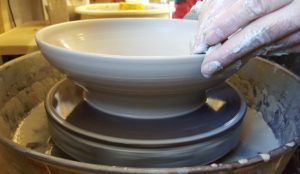
‘Handmade’ means something and it means something important: At the simplest level it means an individual or individuals put their efforts, their attention and brought their skills into the creation of the product from start to finish, (as opposed to machinery made.) But just because a product is handmade doesn’t mean it is a quality product. There is a plethora of poorly ‘handmade’ items out there, and there are excellent handmade creations too. Ours, it must be said, are of the latter category. That is our constant goal and according to our customers’ reviews, our usual result.
Being high quality, handmade creations, however, doesn’t mean they show no signs of their making or the processes they go through. There can be ‘imperfections’ where the nature of the clay or the glazes or the anomalies of kiln-firing display themselves in unexpected ways. A bit of sand or grog may poke through the glaze somewhere or the glaze may show variable coloring. This is as it should be. They are, after all, one-of-a-kind and these little imperfections demonstrate that, and distinguish them from mass produced, mold-made products.
If any of our fountains has any such cosmetic anomaly which renders the fountain less attractive, we point that out and reduce the price. (We don’t sell fountains with compromised functionality). If, however the ‘flaw’ is truly minor, occurs naturally, is harmless and hardly noticeable, (or in fact, adds to the beauty), we may not mention it – this is ceramics and the variables inherent in ceramics are many.
The Japanese have a term for appreciating the imperfections found in nature (as opposed to imperfections that result from poor work) and that is the now well known term Wabi Sabi. If an imperfection occurs naturally and does not detract from the beauty of the fountain we may not reduce for it. If something went wrong, we will. Or if you are not pleased we will, before or after purchase.
